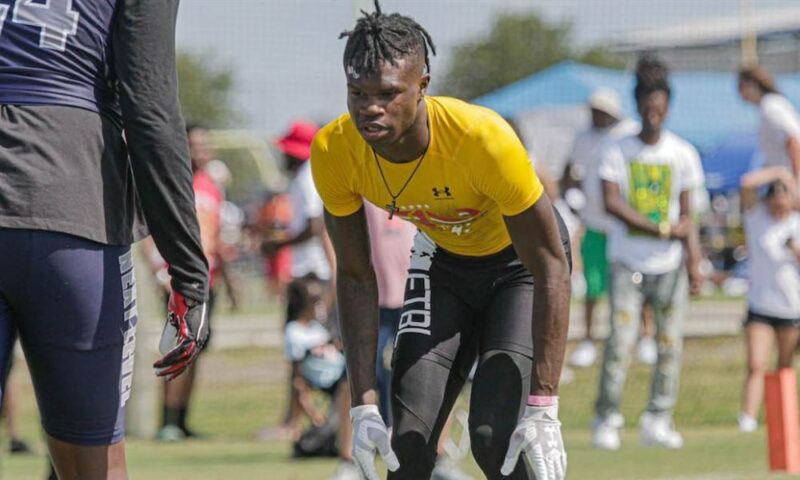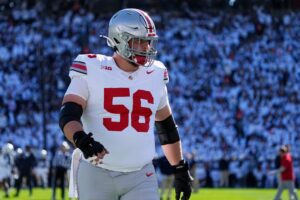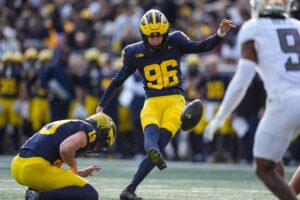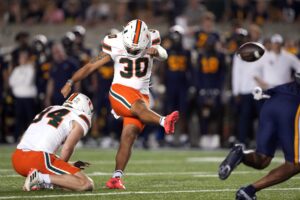What’s Wrong With Travis Hunter?
“What’s wrong with Travis Hunter?” In many of our discussions with fans and fellow writers alike, we heard this refrain no less than a dozen times. My own family, some of whom have or had dreams of playing college football themselves, uttered the same question in the following weeks after Early Signing Day.
The Background
For those not already familiar, here is the brief background leading to the question. Gwinnett County, Georgia operates as a veritable football talent mill. Part of the Atlanta metro area, the county boasts the most Division 1 football recruits in Georgia over the last decade. It is little surprise then that the county produced Collins Hill product Travis Hunter, the unquestioned number one recruit in the Class of 2022 according to 247Sports, which assigned him an 0.9999 rating.
Thus, he wasn’t just the number one recruit in the Class of 2022. In the last 12 recruiting classes (dating back to the Class of 2011), there have only been five other players assigned a rating of 0.9999 or above. Only one of those players (Quinn Ewers) still plays college football. The rest (Trevor Lawrence, Rashan Gary, Robert Nkemdiche, and Jadaveon Clowney) all represent first-round picks in the NFL draft. Two of them (Lawrence and Clowney) represent first overall selections. Recent history certainly favors fame and fortune for Hunter, regardless where he chose to play football.
Indeed, a long-time Florida State commitment, Hunter looks the part of the number one recruit. He uses elite speed on both sides of the ball. He can return kicks and punts, work as an aggressive cornerback, and line up as an electric playmaking wideout. We saw him play in the Georgia 7A State Championship, and he was unmistakably the best player on a field crowded with more than a dozen Power Five prospects. On Early Signing Day, however, Hunter surprised everybody by spurning Florida State and signing with Jackson State.
Who Is Jackson State?
If you are an average football fan, chances are you had not heard of Jackson State until Deion Sanders agreed to coach there prior to the 2020 football season. That said, Jackson State has a rich history as an HBCU. In the 60s and 70s, Jackson State produced four future pro football hall-of-famers: Lem Barney, Robert Brazile, Jackie Slater, and, most notably, Walter Payton.
The Tigers play Division 1 football in the Football Championship Subdivision (FCS). Since 1958, they have called the Southwestern Athletic Conference (SWAC) home. They have won the SWAC title 17 times since joining. The Tigers, however, have been ineffectual in the FCS playoffs, going zero for 12 in all 12 appearances. Sanders certainly hopes to change that, and the team’s on-field performance has been trending in that direction the last two years.
Jackson State’s Recent Talent Level
Indeed, since Sanders came to the program, Jackson State has witnessed an immediate injection of talent. According to the 247Sports database, in the years between 2001 (the beginning of the Modern Recruiting Era) and 2019 (the final year before Sanders signed on as head coach), Jackson State recruited a total of just 13 players assigned star-rankings. Over 19 recruiting classes, they averaged less than one recruit per season that showed up on national recruiting radars. Only three of those players, had even so much as a three-star rating.
Since Sanders joined Jackson State, however, he has attracted plenty of talent. Sanders added one three-star transfer to the roster into the Class of 2020. For the Class of 2021, Sanders attracted four four-star transfers, 11 3-star transfers, four four-star high school recruits, and 10 three-star high school recruits. Even without Hunter, for the Class of 2022, Sanders brought in two four-star transfers, six three-star transfers, and two three-star transfers. That represents a complete overhaul of the roster and talent level.
For now, Hunter represents the crown jewel of that talent base. Sanders believes, however, that this is just the beginning. He expects to continue to attract this level of talent.
The HBCU Movement
Recently, Grambling State’s Head Coach Hue Jackson responded to the news of Hunter signing with Jackson State with a simple comment: let’s take that moment and turn it into a movement. Jackson, we think, undersells that the movement has been well underway. This may be a signature moment in that movement, but it is not the beginning of it, nor will it likely be the end.
All across the country over the last decade, things have been building. As much as fans want to ignore that sociopolitical issues impact sports, this fact remains true: like any of us who perform any manner of “job,” athletes and student athletes care just as much about current events. Consider this. The numbers have been in for years. Nearly 70% of NFL players are black athletes. Well over half of NFL players (regardless of color) come from counties that have a median income below the poverty line. In football and basketball, anyway, college athletics do not look much different. For example, about 60% of college athletes playing football or basketball are black.
Thus, when young men or women of color face police brutality, well, college athletes care about those issues. Black lives matter includes the majority of their lives, too. However, fans’ reactions to their teams’ student-athletes’ voicing their support for certain views has become increasingly sharp.
Shut Up and Play
We can cite a litany of examples here. Articles and posts about Ole Miss players angry at the continued use of the confederate flag were met with reactions of anger and laughter. Think back to the reactions to Oklahoma State player reactions to Mike Gundy wearing an OAN t-shirt. Or consider Texas players protesting against the continued playing of the “Eyes of Texas” anthem.
Like some of their professional counterparts (see Colin Kaepernick), black college athletes (and their white teammates who share or support their views) draw increasing ire from fans. Those fans utter some iteration of the phrase: “shut up and play.” Indeed, in direct response to the “Eyes of Texas” controversy, many voices suggested players do just what Hunter has done: choose HBCU.
While the star power Sanders brought to Jackson State clearly helped the school land such a high concentration of nationally-rated talent, other HBCUs have seen a similar jump in recent years. Before 2014, for example, Grambling State had not landed a star-rated recruit in the history of the modern recruiting era. Since then, they enrolled 16. Six of those have come in the last three classes. The average jumped from one every two years to two per year almost overnight (a four-fold increase). Howard didn’t have a single star-rated high school recruit before 2017. Now, they have a total of 15.
The “NIL Deal”
Almost immediately after we heard that Hunter was even considering flipping to Jackson State, the reactions started pouring in. Why would Hunter ever consider such a thing? Shortly after fans started asking the question, rumors started flying. First, Hunter was offered a million dollars by Barstool Sports to attend Jackson State. Then, the number increased to a million-and-a-half.
As far as we can tell, the “breaking” news came from the twitter account of BeanInvest. Despite some digging, we could not find any earlier mention of this news. News reports from that day all quote the BeanInvest tweet and tweets quoting it for their source. BeanInvest is not exactly a sports-related account. Its tweets prior to this event garnered an average interaction rate in the single digits. Nearly all of those tweets centered on alternate investment strategies (primarily alternative cryptocurrencies). Then came the breaking news tweet that “reported” as follows:
🚨BREAKING🚨
Barstool Sports and Penn National Gaming have reached a deal with the #1 high school player in the nation, Travis Hunter.
This deal is rumored to be in the millions. $penn pic.twitter.com/TxZALOKRiF
— BeanWealth (@bean_wealth) December 15, 2021
That tweet has been liked by over 2,500 people, and it has been retweeted over 1,200 times. But consider the source.
Since this tweet, everyone with knowledge has outright denied this NIL deal, including Sanders himself. Barstool CEO Dave Portnoy played coy, and responded simply with “no comment,” when asked to confirm. A “no comment” by most people could be interpreted as a tacit admission. With Portnoy, however, it is more likely that he is simply basking in the attention that he thrives on.
That said, absent the tweet from BeanInvest, there is no source material suggesting the existence of such a deal.
Why Believe The Rumor?
This leads us back to our initial question. What’s wrong with Travis Hunter? Why would he ever go to Jackson State? Even with such a star-powered head coach, fans simply can not believe that Hunter would ever freely choose Jackson State over Florida State, even with Florida State in a free-fall as a program.
There are certainly reasons fans would believe a player would sign a huge NIL deal. After all, the most recent number 1 recruit, Quinn Ewers, signed such a deal before ever stepping foot on a college campus just last year. Barstool Sports has also been a player in the NIL world. Against a backdrop of recent experience then, fans could easily see a world where NIL money influenced the choice.
Here’s the thing, though. Ewers signed a $1.4 million deal that was not contingent on him going to any particular school. He initially went to Ohio State, before transferring to Texas. Surely, Hunter could get a deal making seven figures by going a similar route. So a $1 million to $1.5 million deal to go to Jackson State does not represent some windfall that he could not find elsewhere.
No, that’s not it. The subtext underlying the question–and the answer some random Twitter account pulled out the air–was different. It was why, specifically, would Hunter choose an HBCU. The Barstool Sports rumor afforded a more “believable” answer than what Hunter’s own twitter account offers. Hunter went to an HBCU to be a part of a larger history.
Does That Mean The Rumor Is False?
So far, we know this. The rumor traces its origin to a dark corner of Twitter, from an account with triple-digit followers (at the time of the tweet) that had no specific expertise or connections from which to break such news. Those closest to Jackson State have denied the rumor flatly. As far as we know, Hunter has never mentioned it himself. Barstool Sports also has not confirmed such a deal, even though they have been very quick to confirm rumored deals with players in the past.
There are legitimate reasons for the parties alleged to be involved to deny or fail to confirm the deal. Mississippi law requires a player to actually be enrolled in college before entering into an NIL deal. That state also specifically prohibits any entity or individual from offering an NIL deal to a prospective individual to induce them to enroll in a particular school. Arguably, the law prohibits parties from even offering an NIL deal to a prospective college athlete at all. The law also clearly prohibits any company with sports betting associations from offering NIL deals to student-athletes. Barstool Sports has openly proclaimed its intent to become an online gambling site. Georgia’s laws are a bit less restrictive, but not particularly different in these critical areas.
As such, the rumored deal violates the very limited but clear NCAA prohibition of using NIL deals to induce an athlete to commit to a particular school. The deal also violates Georgia and Mississippi state law. Thus, if a deal along these lines were actually offered, nobody could yet be held to it. It violates state law (and is therefore void), and it would jeopardize Hunter’s eligibility.
Again, though, consider the source of the rumor. Hunter will no doubt make money off of his name, image, and likeness once enrolled at Jackson State. That would have been the case anywhere he went. But fans ran wild with a rumor that started literally from a random Twitter account.
What’s Wrong with Travis Hunter?
So what’s wrong with Travis Hunter? Our answer will not be popular, but it’s simple: absolutely nothing. Hunter is a gifted athlete. He earned a rating that has only been given eight other times in the history of the modern recruiting era. Every other player who earned that rating (and is not still in college) has been drafted into the NFL. All but one of them earned a first-round draft selection. The odds of Hunter enjoying a long professional career are ever in his favor. Hunter’s decision to go to Jackson State does not diminish his talent or potential.
Sanders was similarly a gifted athlete who could do multiple things on the football field and could play multiple sports (as Hunter could). Sanders offers the star power that very few (if any) other college coach can offer. Hunter did not exactly pick a name out of a hat here.
The HBCU movement has been picking up momentum over the last five to ten years. Hunter’s flip represents the most noteworthy moment in that movement, but it is not the only one. It probably won’t be the last either.
Hunter does not jeopardize his capacity to earn NIL dollars by making this decision. Maybe he moved the needle in his favor some, but by a negligible amount either way. So this decision will not hurt him in this regard either.
So we conclude where we began. What’s wrong with Travis Hunter? Nothing. And maybe we ought to ask ourselves, “what’s wrong with us?” for having such a hard time believing that the HBCU angle Sanders sold to Hunter was compelling to a young black student-athlete.
Main image courtesy USA Today






